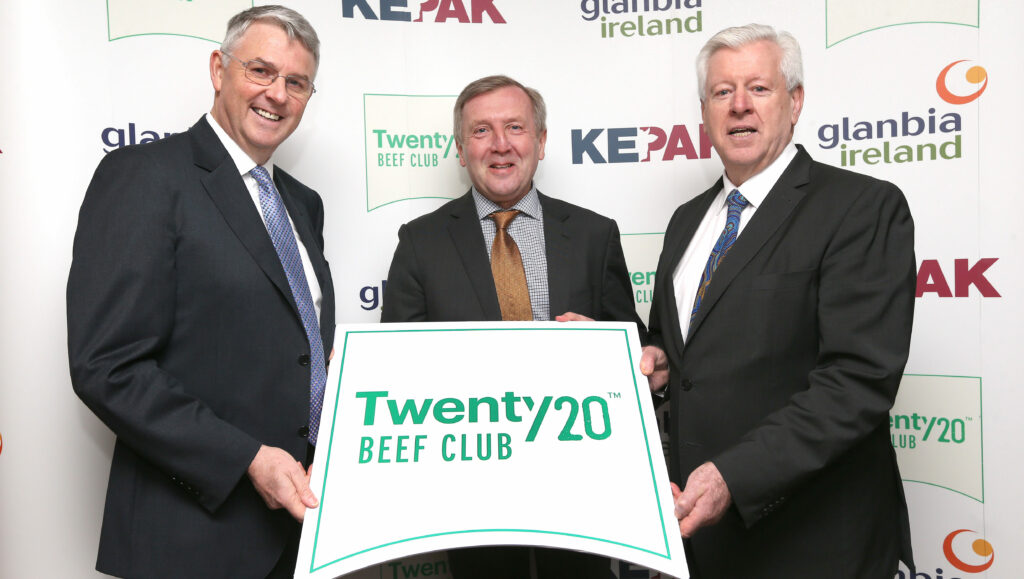A new calf-to-beef programme – dubbed the “Twenty20 Beef Club” – has been unveiled by Glanbia Ireland and Kepak Group earlier today, Wednesday, April 3.
According to the partnering companies, the initiative affords members: a guaranteed market for their heifers and steers with a “predictable and transparent pricing formula at time of slaughter”; a production blueprint supported by safe and secure high-quality farm inputs; and leading-edge technical advice.
For Kepak customers and consumers, the Twenty20 Beef Club will provide a secure and predictable supply of high-quality beef with unrivalled traceability and with the attributes of a “closed loop” supply chain.
This year will be a pilot year for the programme, with a target of 6,000 calves from Glanbia Ireland supplier dairy farms in the Republic of Ireland.
Over the coming years Glanbia Ireland and Kepak have ambitious plans to rapidly expand numbers in the programme to 50,000 per annum.
This optional programme component, administered by Finance Ireland, will pay a Twenty20 Beef Club Member €35 per animal per month from months three to 24.
Glanbia Ireland and Kepak Group are in discussions with Finance Ireland whereby this advance payment option would be offered to all qualifying club members after the pilot phase.

L-R: Jim Bergin, chief executive of Glanbia Ireland; Michael Creed, Minister for Agriculture, Food and the Marine; and John Horgan, chief executive of Kepak Group. Image source: Finbarr O’Rourke
The Twenty20 Beef Club is open to Glanbia Co-op members and current Kepak suppliers.
Members can be either dairy farmers or beef finishers, with a minimum of 25 calves required per farm.
Suckler farmers that purchase dairy beef calves can also enroll qualifying animals bred and produced on their own farm that meet the ‘club’ criteria in the programme.
Bonuses
Animals enrolled in the first two years of the club will be paid the average market price, plus a Club Premium of 15 to 25c/kg, as well as a Club Protocol Bonus of 12c/kg.
Club members will also benefit from additional price support in the event of a weak market price. There will also be a “seasonality” bonus to promote the marketing of animals in April (6c/kg), May (10c/kg) and June (6c/kg).
Members of the club will also be eligible for Angus or Hereford breed bonus payments, which are guaranteed at the point of entry for the pilot phase.
To assure the feed and food safety credentials of beef from the Twenty20 Beef Club and to deliver the optimum animal performance, all relevant farm inputs consumed by club herd will be sourced and supplied by Glanbia Ireland.
Glanbia and Kepak technical teams will provide farm support and nutritional advice to participating farmers. Guidance on sire selection to optimise animal performance and eating quality, on meeting market requirements and on slaughter timings will be provided to club members by Kepak’s agriculture team.

L-R: Jim Bergin, chief executive of Glanbia Ireland; Michael Creed, Minister for Agriculture, Food and the Marine; and John Horgan, chief executive of Kepak Group. Image source: Finbarr O’Rourke
For the beef customer, this will create a high quality “closed loop” supply chain from animal genetics through to the marketplace.
Members of the club will be required to strictly adhere to a defined rearing programme – jointly developed by Glanbia Ireland and Kepak.
Glanbia Ireland and Kepak have designed the initial five-year programme to meet ambitious economic and environmental performance targets.
- A reduction in the average age at slaughter of club cattle – to 24 months on average;
- A reduction in the average carbon footprint of club farms – through the use of methane reducing feed additives, reduction in the average age of slaughter, improved feed conversion efficiency, reduced feed waste and improved fertility across the herd;
- An improvement in the eating quality attributes of the club meat through a combination of better genetics, nutrition management and optimum processing techniques;
- An increase in the proportion of dairy bred cattle meeting market specified targets;
- An increase in beef output and sales value per hectare – through enhanced on farm efficiencies, breeding, feeding, grassland management, animal health/welfare and slaughter preparation and selection.
Welcoming the announcement, Michael Creed, Minister for Agriculture, Food and the Marine, said:
“I would like to congratulate both Glanbia and Kepak on the launch of this programme today.
Seeing our two main livestock sectors working together is very encouraging, and such a collaborative approach between different sectors in Irish agriculture is something that should be fostered and developed.
“Some of the innovative elements of this programme could make a real difference to improving the sustainability of both beef and dairy farmers, and provide a template for future cooperation.”
